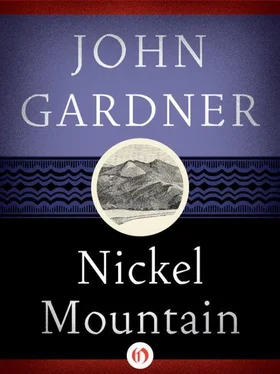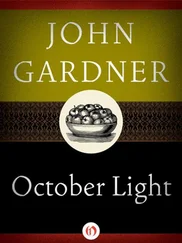One afternoon (it was the end of July; a hot, muggy day) Henry said, “I sure don’t know what I’ll do around here without you, Callie. When you go and get married this place here’s gonna fall down around my ears.”
She smiled, false, then covered her face and cried, and it hit him that Willard Freund was not coming back.
“Now here, here,” he said, going to her, patting her shoulder. “Callie old girl, you been working too hard. You just take this afternoon off.”
“Get away,” she said, pushing at his arm. “Damn you, please. Just this once, leave me alone!”
Henry backed off, scratching the back of his hand. He went back into his room.
“All right, then,” he said to himself. “All right, then.”
He’d sent her home early, a little before eight, and had turned out the neon and the diner lights and closed the lean-to door behind him. The only suit he had was the black one his father had left, but it fit as though it had been made for him. (He was getting heavy, by Jesus. He’d never have believed he could fill the old man’s suit.) He found the old brown fedora on the shelf, and that fit too, nearly. It rested on his ears. When he inspected himself in the mirror he found he looked very good. Big as the world, but good. Serious, anyway; imposing. That was what he was after. He locked the back-room door behind him, because of the dark formality in his chest — he hadn’t locked that door for maybe fifteen years — and went out to his car. The night was as hot and muggy as the day had been; not a breath of air, not so much as a cricket stirring. He took one of the little white pills and started the motor.
Crow Mountain was dark as a tomb. All the way up to George Loomis’s place there wasn’t a car but Henry’s on the road. He pulled up in the driveway and sat a moment to calm himself and go over what he meant to say one last time; then he got out. The house was dark and he felt an instant’s panic: He hadn’t been prepared for the possibility that George might be away. But then he saw he’d made a mistake. There was the usual blue-white flicker in the kitchen. He knocked.
“Well, Jesus please us,” George said, stepping back from the door. “Who in hell died?”
Henry took off his hat. “Do you mind if I come in, George?”
George held his hand up. “Let me think a minute. Yes, I do. I do mind. You’ve taken up selling Bibles on the side.”
“Now, George,” Henry said.
“Well, shit,” George said, “come on in, then. But don’t tell me why you’re dressed up like that. Either you been to church or you been courting, and whichever it is, I think I might get sick.”
“Now, damn it, George,” Henry said.
“Oh, hush up and sit down. It’s good to see you. I’ll see if I still got some whiskey.” He started past the television, paused a moment to watch one of the cowboys shoot the other one, then went on to the cupboard under the sink. “Just a little bourbon left,” he called back.
“That’s fine,” Henry said. He could use it.
George talked about television programs while he fixed the drink and brought it over to the metal table. Henry was missing a great deal, George said, refusing to give in to the electronic revolution. He ran on for maybe five minutes or more, Henry merely nodding helplessly, playing with the hat on the table in front of him, missing half of what George said because of the noise from the machine. At last Henry said feebly (it was hardly going exactly as he’d planned), “Could we turn the television off, George, so we could hear?”
“What the hell? Sit in the dark?”
“Maybe the room lights still work,” Henry said. He laughed.
George considered it, then got up and went over to the switch by the door. The lights went on, and George seemed surprised and pleased. He turned off the television. “Ok,” he said then, “what are you selling.”
“I want you to marry Callie Wells,” Henry said. He had not meant to make it quite so blunt, and he felt himself reddening.
George stared, then looked over at the television as though maybe that had said it. He came over and sat down. “You’re willing to pay me, I suppose?” he said, lifting his glass to drink.
It seemed to Henry a natural question, though he hadn’t expected it would come up so quickly. He said, “I’ll write you a check right now for a thousand dollars.”
George choked, set down his glass, and got up to go to the sink. “You crazy old goat,” he began, but another choking fit hit him. The cords of his neck pumped, and it looked as if he might retch. Henry watched, wide-eyed, the checkbook in his fist. “You crazy old goat,” George Loomis roared, “you think I’d marry some girl I hardly know for a thousand dollars? Or ten thousand? Or a thousand million? Look, I don’t love her. I don’t even like her. She stinks. You know that? The word of God!”
“George, that’s not true. You said yourself—”
“I said myself what?”
“You said you were thinking of marrying her.”
His eyebrows lowered, and suddenly he wasn’t partly joking any more. He looked scared. “Now, wait a minute,” he said. He looked at his hands, saw they were empty, then came over quickly to the drink on the table. He said when he’d swallowed, “Since the day I was born, Henry Soames, I never said—”
“Yes, you did,” Henry said. “That night when you came to my place drunk you said to her — to her, George—”
“Jesus God,” George said.
“You did, George.” He added, inspired, “There were witnesses, too.”
George Loomis bit his lip, staring. Abruptly, he got up and went over to the cupboard below the sink. The bourbon bottle was empty now. He dropped it in the wood-box beside the stove and opened the cabinet to the left of the sink — full of antique china and real cut glass — then closed it again and went over to the cabinet on the right. At last he came back to the table and sat down. He leaned his forehead on his hands.
Henry said, “She’s a fine girl, George. It’s the truth. She’d make you a good wife. Inside a month she’d have this place of yours—” He caught himself too late.
“Christ, don’t I know it,” he said. He shook his head like a man driving out a nightmare. Then he said, “What else happened that night, Henry?”
Henry frowned, puzzled.
“I mean, what did I say exactly? And did I—” He waved vaguely.
“You said you admired her and you were thinking of marriage.”
“I remember that, yeah. But did I—?” He wet his lips, then said quickly, “Well, I noticed that Callie these last few weeks — that is, there are signs — you know what I mean.”
Henry’s heart ticked rapidly, and for an instant the temptation seemed irresistible. But he said, knowing the moment he said it that he was beaten now, “No, not that. That was somebody else.”
George let out his breath as though he’d been holding it half-an-hour.
Henry said, “It’s not true that she stinks, George. It’s a lie and you know it.”
George smiled, watching him, sly.
“I’ll give you fifteen hundred dollars,” Henry said. “That’s as high as I’ll go.”
“I don’t love her, Henry,” George said. “And Callie don’t love me either, near as I can tell. I seen on television how they act when they love you.”
“Well you can learn to love her. She’s a good, hardworking, honest girl, and she’s a sweet girl, too. When she touches you she can be gentler than — I don’t know what.”
George still sat watching him, more sly than ever. “Why don’t you marry her, Henry?”
“Listen, a man that can’t learn to love Callie Wells can’t learn to love anybody. You ready to admit you can’t love any woman at all? You ready to admit you want to die all alone in this godforsaken museum and be found sometime two years later?”
Читать дальше











